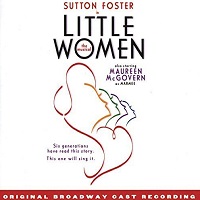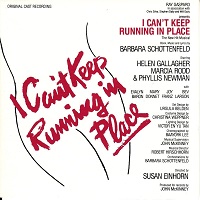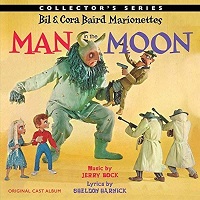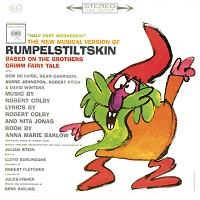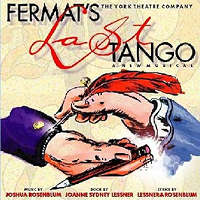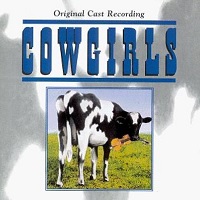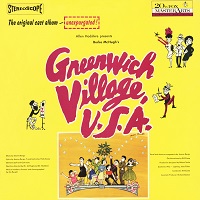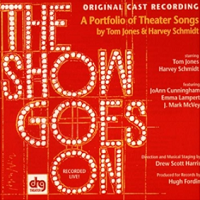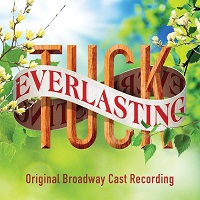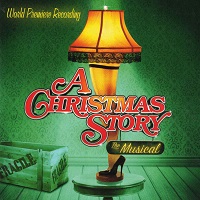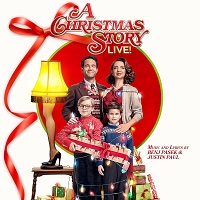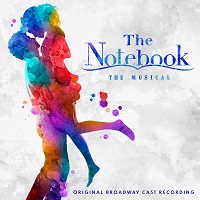 Original Broadway Cast, 2024 (Atlantic)
Original Broadway Cast, 2024 (Atlantic)  (3.5 / 5) The Notebook wears its heart on its sleeve. And why wouldn’t it? From Nicholas Sparks’ novel to Nick Cassavetes’ film to Ingrid Michaelson’s Broadway musical, the story of Noah, a boy from the wrong side of the tracks, and rich girl Allison, who fall in love as teenagers and stay in love for the rest of their lives, has touched people all over the world. The question presented by this cast album is: How many earnest pop ballads about love can fit in one musical? And the answer is, a surprising amount. Michaelson’s music is lush and catchy, and only in the latter part of the score does it begin to feel repetitive. Her lyrics, written more in the pop vein, often deal in false rhymes (“time/mine,” “coin/joy,” etc.), and in doing so, they don’t quite give the ear what it wants. These lyrics also lack some of the specificity that musical theater requires. But where the score comes up short, the wonderful performances of the six leading cast members who play Noah and Allie at three different stages of their lives make up for it. John Cardoza as Young Noah has an especially delightful, buttery voice that lends itself perfectly to Michaelson’s musical style, and the gruff sound of Dorian Harewood as Older Noah provides an excellent contrast to the expansive vocal quality of the four younger performers. One of the album’s greatest losses is Maryann Plunkett’s full performance as Older Allie. Since her character has dementia for the duration of the show, the authors choose not to have her sing until the finale. When Plunkett does sing, and also when she delivers the snippets of dialogue that are included on the recording along the way, she infuses the character with reality, fire, and beauty. Happily, there are plenty of delights even in her absence. If pop artists were still covering songs from musicals, a few numbers in this score could easily be stand-alone hits: “I’ll Leave the Light On,” Middle Noah’s tribute to the lover he’s gone too long without seeing, is deliciously mournful, and “If This Is Love,” Younger Allie’s account of her feelings towards Noah, is an innocent delight. But The Notebook is strongest as a musical theater recording, rather than a pop album, when it deals with more serious topics; “I Want to Go Back,” in which Younger and Middle Allie voice the frustrations of their older counterpart about being forced to stay in a hospital, is likely to give the listener goosebumps with its soaring melody and plaintive lyrics: “Is it time for dinner? / Is it time for forever?” Indeed, any time Noah and Allie sing in harmony across the generations, it’s immensely satisfying to the ear, their voices blending beautifully and hauntingly. These moments of intergenerational connection could’ve been less frequent in order to maximize their impact, but the listener will be grateful for the aural riches that are present. In live performances of The Notebook, the sounds of audience members sniffling, crying, and outright bawling can be heard during the show’s final scenes and even during the curtain calls. Listeners to the cast album may have a similar response, because even if the songwriting isn’t consistently up to par, it’s good enough to deliver a powerful emotional wallop. — Charles Kirsch
(3.5 / 5) The Notebook wears its heart on its sleeve. And why wouldn’t it? From Nicholas Sparks’ novel to Nick Cassavetes’ film to Ingrid Michaelson’s Broadway musical, the story of Noah, a boy from the wrong side of the tracks, and rich girl Allison, who fall in love as teenagers and stay in love for the rest of their lives, has touched people all over the world. The question presented by this cast album is: How many earnest pop ballads about love can fit in one musical? And the answer is, a surprising amount. Michaelson’s music is lush and catchy, and only in the latter part of the score does it begin to feel repetitive. Her lyrics, written more in the pop vein, often deal in false rhymes (“time/mine,” “coin/joy,” etc.), and in doing so, they don’t quite give the ear what it wants. These lyrics also lack some of the specificity that musical theater requires. But where the score comes up short, the wonderful performances of the six leading cast members who play Noah and Allie at three different stages of their lives make up for it. John Cardoza as Young Noah has an especially delightful, buttery voice that lends itself perfectly to Michaelson’s musical style, and the gruff sound of Dorian Harewood as Older Noah provides an excellent contrast to the expansive vocal quality of the four younger performers. One of the album’s greatest losses is Maryann Plunkett’s full performance as Older Allie. Since her character has dementia for the duration of the show, the authors choose not to have her sing until the finale. When Plunkett does sing, and also when she delivers the snippets of dialogue that are included on the recording along the way, she infuses the character with reality, fire, and beauty. Happily, there are plenty of delights even in her absence. If pop artists were still covering songs from musicals, a few numbers in this score could easily be stand-alone hits: “I’ll Leave the Light On,” Middle Noah’s tribute to the lover he’s gone too long without seeing, is deliciously mournful, and “If This Is Love,” Younger Allie’s account of her feelings towards Noah, is an innocent delight. But The Notebook is strongest as a musical theater recording, rather than a pop album, when it deals with more serious topics; “I Want to Go Back,” in which Younger and Middle Allie voice the frustrations of their older counterpart about being forced to stay in a hospital, is likely to give the listener goosebumps with its soaring melody and plaintive lyrics: “Is it time for dinner? / Is it time for forever?” Indeed, any time Noah and Allie sing in harmony across the generations, it’s immensely satisfying to the ear, their voices blending beautifully and hauntingly. These moments of intergenerational connection could’ve been less frequent in order to maximize their impact, but the listener will be grateful for the aural riches that are present. In live performances of The Notebook, the sounds of audience members sniffling, crying, and outright bawling can be heard during the show’s final scenes and even during the curtain calls. Listeners to the cast album may have a similar response, because even if the songwriting isn’t consistently up to par, it’s good enough to deliver a powerful emotional wallop. — Charles Kirsch
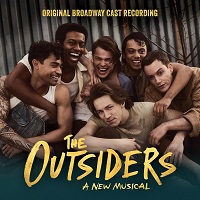 Original Broadway Cast, 2024 (Masterworks Broadway)
Original Broadway Cast, 2024 (Masterworks Broadway)  (3 / 5) The Outsiders followed the popular book-to-movie-to-musical path and arrived on Broadway in 2024. It started out as a novel written by teenage author S.E. Hinton, published in 1967, about two rival groups of teenagers separated by social status — the lower class greasers and the upper class “Socs.” The novel quickly became a staple for high school reading and was further ingrained in American culture via the 1983 Francis Ford Coppola film, with a cast of future stars including Tom Cruise and Rob Lowe. The musical retains much of the novel’s heavy plot and all of its earnestness, with songs by Broadway newcomers Jonathan Clay, Zach Chance, and Justine Levine. While the score pulsates with folk rhythms and country melodies, many of the lyrics are less than adept — for example, “It’s hard to write the story when the story’s writing me,” “It’s Friday night and it feels so right.” The novel was written in the first-person perspective, and the musical’s creators have not found a fully satisfactory way of balancing the exposition from the source material with the necessary dramatic elements required to tell the story on stage and through song. The main protagonist, a 14-year-old named Ponyboy Curtis (played and sung with sensitivity by Brody Grant), is a member of the greasers gang along with Johnny Cade (Sky Lakota Lynch), Sodapop (Jason Schmidt), Dally (Joshua Boone), and Ponyboy’s older brother, Darrel (Brent Comer). Despite violent confrontations between the rival gangs, Ponyboy makes a connection with one of the “Soc” girls, Cherry Valance (Emma Pittman). Refreshingly, though, the show avoids a Romeo and Juliet-like romantic storyline by focusing on the fraternal relationships among the greasers. In addition to the first few numbers being loaded down by exposition delivered directly to the audience, the score sometimes leans towards melodrama (for example, “Death’s at My Door” and “Throwing in the Towel”). But happily, when the conflict between the two gangs escalates, The Outsiders finds its footing and amps up the excitement in songs such as “Justice for Tulsa” and “Trouble.” The Dally character gets two stellar musical moments, the jazzy “Little Brother” and “Run Run Brother,” while the 11 o’clock number, “Stay Gold,” sung by Ponyboy and Johnny Cade, has the show’s most endearing melody, despite a distracting amount of reverb on this recording. All of the songs are aided mightily by Justine Levine’s fantastic orchestrations. — Forrest Hutchison
(3 / 5) The Outsiders followed the popular book-to-movie-to-musical path and arrived on Broadway in 2024. It started out as a novel written by teenage author S.E. Hinton, published in 1967, about two rival groups of teenagers separated by social status — the lower class greasers and the upper class “Socs.” The novel quickly became a staple for high school reading and was further ingrained in American culture via the 1983 Francis Ford Coppola film, with a cast of future stars including Tom Cruise and Rob Lowe. The musical retains much of the novel’s heavy plot and all of its earnestness, with songs by Broadway newcomers Jonathan Clay, Zach Chance, and Justine Levine. While the score pulsates with folk rhythms and country melodies, many of the lyrics are less than adept — for example, “It’s hard to write the story when the story’s writing me,” “It’s Friday night and it feels so right.” The novel was written in the first-person perspective, and the musical’s creators have not found a fully satisfactory way of balancing the exposition from the source material with the necessary dramatic elements required to tell the story on stage and through song. The main protagonist, a 14-year-old named Ponyboy Curtis (played and sung with sensitivity by Brody Grant), is a member of the greasers gang along with Johnny Cade (Sky Lakota Lynch), Sodapop (Jason Schmidt), Dally (Joshua Boone), and Ponyboy’s older brother, Darrel (Brent Comer). Despite violent confrontations between the rival gangs, Ponyboy makes a connection with one of the “Soc” girls, Cherry Valance (Emma Pittman). Refreshingly, though, the show avoids a Romeo and Juliet-like romantic storyline by focusing on the fraternal relationships among the greasers. In addition to the first few numbers being loaded down by exposition delivered directly to the audience, the score sometimes leans towards melodrama (for example, “Death’s at My Door” and “Throwing in the Towel”). But happily, when the conflict between the two gangs escalates, The Outsiders finds its footing and amps up the excitement in songs such as “Justice for Tulsa” and “Trouble.” The Dally character gets two stellar musical moments, the jazzy “Little Brother” and “Run Run Brother,” while the 11 o’clock number, “Stay Gold,” sung by Ponyboy and Johnny Cade, has the show’s most endearing melody, despite a distracting amount of reverb on this recording. All of the songs are aided mightily by Justine Levine’s fantastic orchestrations. — Forrest Hutchison


 (2.5 / 5) Scott Brown and Anthony King developed this two-person comic gem about two composers writing a musical. The fictional writers have created a show portraying Johannes Gutenberg and the invention of the printing press to help a town’s illiterate populace. This recording features in the roles of the two aspiring writers Christopher Fitzgerald as Bud Davenport and Jeremy Shamos as Doug Simon. Bud and Doug are very sincere, but their show is very bad. Nevertheless, they are pitching it to audiences and (they hope) to “famous Broadway producers.” Unfortunately, since this is just a reading and they don’t have a cast yet, Bud and Doug are forced to play all of the parts themselves, including the title role as well as an evil monk, a lovely young woman (aptly named Helvetica), and all of the other various townspeople. This potentially confusing premise is kept afloat by distinctive performances from Fitzgerald and Shamos, who take on unique accents and personas for each of the characters. On stage, the actors would don hats bearing the character names or descriptions to help make it clear to the audience whom they were playing at any given moment, speedily switching from one to another, and while these visual gags can’t be seen on the recording, it’s a credit to the duo that listeners could almost forget that this was a two-person show when listening through the cast album. While the material is enjoyable, it is slight; the comedy is hit-or-miss, and there are crass jokes about dead babies, anti-Semitic flower girls, and even suicide. In the end, the songs most often prompt unfavorable comparisons to other scores: for example, Urinetown comments on itself more cleverly, while [title of show] breaks the fourth wall more effectively. Still, the “plot” of Gutenberg! The Musical is delightfully wacky, crazy enough to keep you laughing but just grounded enough to make you think that someone out there might possibly think the show within this show would be a good idea. — Forrest Hutchinson
(2.5 / 5) Scott Brown and Anthony King developed this two-person comic gem about two composers writing a musical. The fictional writers have created a show portraying Johannes Gutenberg and the invention of the printing press to help a town’s illiterate populace. This recording features in the roles of the two aspiring writers Christopher Fitzgerald as Bud Davenport and Jeremy Shamos as Doug Simon. Bud and Doug are very sincere, but their show is very bad. Nevertheless, they are pitching it to audiences and (they hope) to “famous Broadway producers.” Unfortunately, since this is just a reading and they don’t have a cast yet, Bud and Doug are forced to play all of the parts themselves, including the title role as well as an evil monk, a lovely young woman (aptly named Helvetica), and all of the other various townspeople. This potentially confusing premise is kept afloat by distinctive performances from Fitzgerald and Shamos, who take on unique accents and personas for each of the characters. On stage, the actors would don hats bearing the character names or descriptions to help make it clear to the audience whom they were playing at any given moment, speedily switching from one to another, and while these visual gags can’t be seen on the recording, it’s a credit to the duo that listeners could almost forget that this was a two-person show when listening through the cast album. While the material is enjoyable, it is slight; the comedy is hit-or-miss, and there are crass jokes about dead babies, anti-Semitic flower girls, and even suicide. In the end, the songs most often prompt unfavorable comparisons to other scores: for example, Urinetown comments on itself more cleverly, while [title of show] breaks the fourth wall more effectively. Still, the “plot” of Gutenberg! The Musical is delightfully wacky, crazy enough to keep you laughing but just grounded enough to make you think that someone out there might possibly think the show within this show would be a good idea. — Forrest Hutchinson
 (2 / 5) The first Broadway production of Gutenberg! reunited former Book of Mormon co-stars Andrew Rannells and Josh Gad, giving them another excellent vehicle to showcase their comedic chemistry and range. As is typical when an Off-Broadway show goes to Broadway, there were some things lost, some things gained. This cast album is longer than the Off-Broadway recording, which at 58 minutes in length was already threatening to outwear its welcome. The additional 10 minutes of material to be found here strain a listener’s goodwill. On the other hand, the spoken dialogue that’s included has been cleverly modified to address listeners to the recording rather than live audience members, and the new jokes are mostly an improvement over those in the previous iteration. Most likely, one’s enjoyment of this album will be closely linked to one’s affinity for Rannells and Gad. They are appropriately earnest as Bud and Doug. and fully committed to each of their bit parts. The best songs are Helvetica’s love ballad, “I Can’t Read,” which contains some expert comedy lyrics; the stereotypical Act 1 Finale, “Tomorrow Is Tonight”; and the deliciously evil “Monk With Me.” On Broadway, the show featured different celebrity guest stars at each performance, playing the famous Broadway producer who offers Bud and Doug their Broadway contract. Mel Brooks was chosen to appear in that brief role on the album, and he’s a wonderful choice for it. — F.H.
(2 / 5) The first Broadway production of Gutenberg! reunited former Book of Mormon co-stars Andrew Rannells and Josh Gad, giving them another excellent vehicle to showcase their comedic chemistry and range. As is typical when an Off-Broadway show goes to Broadway, there were some things lost, some things gained. This cast album is longer than the Off-Broadway recording, which at 58 minutes in length was already threatening to outwear its welcome. The additional 10 minutes of material to be found here strain a listener’s goodwill. On the other hand, the spoken dialogue that’s included has been cleverly modified to address listeners to the recording rather than live audience members, and the new jokes are mostly an improvement over those in the previous iteration. Most likely, one’s enjoyment of this album will be closely linked to one’s affinity for Rannells and Gad. They are appropriately earnest as Bud and Doug. and fully committed to each of their bit parts. The best songs are Helvetica’s love ballad, “I Can’t Read,” which contains some expert comedy lyrics; the stereotypical Act 1 Finale, “Tomorrow Is Tonight”; and the deliciously evil “Monk With Me.” On Broadway, the show featured different celebrity guest stars at each performance, playing the famous Broadway producer who offers Bud and Doug their Broadway contract. Mel Brooks was chosen to appear in that brief role on the album, and he’s a wonderful choice for it. — F.H.
 (3.5 / 5) The Notebook wears its heart on its sleeve. And why wouldn’t it? From Nicholas Sparks’ novel to Nick Cassavetes’ film to Ingrid Michaelson’s Broadway musical, the story of Noah, a boy from the wrong side of the tracks, and rich girl Allison, who fall in love as teenagers and stay in love for the rest of their lives, has touched people all over the world. The question presented by this cast album is: How many earnest pop ballads about love can fit in one musical? And the answer is, a surprising amount. Michaelson’s music is lush and catchy, and only in the latter part of the score does it begin to feel repetitive. Her lyrics, written more in the pop vein, often deal in false rhymes (“time/mine,” “coin/joy,” etc.), and in doing so, they don’t quite give the ear what it wants. These lyrics also lack some of the specificity that musical theater requires. But where the score comes up short, the wonderful performances of the six leading cast members who play Noah and Allie at three different stages of their lives make up for it. John Cardoza as Young Noah has an especially delightful, buttery voice that lends itself perfectly to Michaelson’s musical style, and the gruff sound of Dorian Harewood as Older Noah provides an excellent contrast to the expansive vocal quality of the four younger performers. One of the album’s greatest losses is Maryann Plunkett’s full performance as Older Allie. Since her character has dementia for the duration of the show, the authors choose not to have her sing until the finale. When Plunkett does sing, and also when she delivers the snippets of dialogue that are included on the recording along the way, she infuses the character with reality, fire, and beauty. Happily, there are plenty of delights even in her absence. If pop artists were still covering songs from musicals, a few numbers in this score could easily be stand-alone hits: “I’ll Leave the Light On,” Middle Noah’s tribute to the lover he’s gone too long without seeing, is deliciously mournful, and “If This Is Love,” Younger Allie’s account of her feelings towards Noah, is an innocent delight. But The Notebook is strongest as a musical theater recording, rather than a pop album, when it deals with more serious topics; “I Want to Go Back,” in which Younger and Middle Allie voice the frustrations of their older counterpart about being forced to stay in a hospital, is likely to give the listener goosebumps with its soaring melody and plaintive lyrics: “Is it time for dinner? / Is it time for forever?” Indeed, any time Noah and Allie sing in harmony across the generations, it’s immensely satisfying to the ear, their voices blending beautifully and hauntingly. These moments of intergenerational connection could’ve been less frequent in order to maximize their impact, but the listener will be grateful for the aural riches that are present.
(3.5 / 5) The Notebook wears its heart on its sleeve. And why wouldn’t it? From Nicholas Sparks’ novel to Nick Cassavetes’ film to Ingrid Michaelson’s Broadway musical, the story of Noah, a boy from the wrong side of the tracks, and rich girl Allison, who fall in love as teenagers and stay in love for the rest of their lives, has touched people all over the world. The question presented by this cast album is: How many earnest pop ballads about love can fit in one musical? And the answer is, a surprising amount. Michaelson’s music is lush and catchy, and only in the latter part of the score does it begin to feel repetitive. Her lyrics, written more in the pop vein, often deal in false rhymes (“time/mine,” “coin/joy,” etc.), and in doing so, they don’t quite give the ear what it wants. These lyrics also lack some of the specificity that musical theater requires. But where the score comes up short, the wonderful performances of the six leading cast members who play Noah and Allie at three different stages of their lives make up for it. John Cardoza as Young Noah has an especially delightful, buttery voice that lends itself perfectly to Michaelson’s musical style, and the gruff sound of Dorian Harewood as Older Noah provides an excellent contrast to the expansive vocal quality of the four younger performers. One of the album’s greatest losses is Maryann Plunkett’s full performance as Older Allie. Since her character has dementia for the duration of the show, the authors choose not to have her sing until the finale. When Plunkett does sing, and also when she delivers the snippets of dialogue that are included on the recording along the way, she infuses the character with reality, fire, and beauty. Happily, there are plenty of delights even in her absence. If pop artists were still covering songs from musicals, a few numbers in this score could easily be stand-alone hits: “I’ll Leave the Light On,” Middle Noah’s tribute to the lover he’s gone too long without seeing, is deliciously mournful, and “If This Is Love,” Younger Allie’s account of her feelings towards Noah, is an innocent delight. But The Notebook is strongest as a musical theater recording, rather than a pop album, when it deals with more serious topics; “I Want to Go Back,” in which Younger and Middle Allie voice the frustrations of their older counterpart about being forced to stay in a hospital, is likely to give the listener goosebumps with its soaring melody and plaintive lyrics: “Is it time for dinner? / Is it time for forever?” Indeed, any time Noah and Allie sing in harmony across the generations, it’s immensely satisfying to the ear, their voices blending beautifully and hauntingly. These moments of intergenerational connection could’ve been less frequent in order to maximize their impact, but the listener will be grateful for the aural riches that are present. 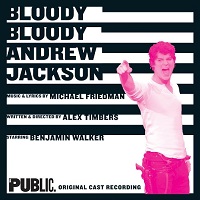
 (1.5 / 5) Before Hamilton took the world by storm in 2016 with a musical style previously underrepresented on Broadway and a story featuring American historical figures, composer-lyricist Michael Friedman and book writer Alex Timbers utilized similar elements to create Bloody Bloody Andrew Jackson in 2010. The cast album was released following the musical’s successful engagement at The Public Theater and before its disappointing run of 120 performances on Broadway. If the show is certainly no Hamilton, its punk rock score still offers some genuine moments to savor. Take the opening number, “Populism Yea Yea.” Only the most hardened critics could resist banging their heads along to the catchy lyrics. And give a listen to the recording’s final track, “The Hunters of Kentucky,” for another prime example of Friedman’s ability to excite the listener. You won’t have long to wait between those two highlights; the recording is a slight 28 minutes long, making it one of the shortest cast albums ever. Bloody Bloody Andrew Jackson attempts to satirize its title character, played by Benjamin Walker, by portraying him as a foulmouthed, angsty, emo rock star. The idea is to lampoon Jackson’s most controversial decisions and actions by attributing them to his immature, reactive personality, a device that may not register when one is listening to the songs out of context. The score also makes the mistake of glamorizing Jackson’s emotionality as the show goes on, depriving the satire of its bite. Additionally, it should be noted that the original production was widely criticized by Native American activist groups, and subsequent productions have been protested, due to the material’s perceived insensitivity in its depiction of historical events. Comparisons to Hamilton only go so far, given Bloody Bloody Andrew Jackson‘s lack of nuance and the disparity in quality between the two scores. — Forrest Hutchinson
(1.5 / 5) Before Hamilton took the world by storm in 2016 with a musical style previously underrepresented on Broadway and a story featuring American historical figures, composer-lyricist Michael Friedman and book writer Alex Timbers utilized similar elements to create Bloody Bloody Andrew Jackson in 2010. The cast album was released following the musical’s successful engagement at The Public Theater and before its disappointing run of 120 performances on Broadway. If the show is certainly no Hamilton, its punk rock score still offers some genuine moments to savor. Take the opening number, “Populism Yea Yea.” Only the most hardened critics could resist banging their heads along to the catchy lyrics. And give a listen to the recording’s final track, “The Hunters of Kentucky,” for another prime example of Friedman’s ability to excite the listener. You won’t have long to wait between those two highlights; the recording is a slight 28 minutes long, making it one of the shortest cast albums ever. Bloody Bloody Andrew Jackson attempts to satirize its title character, played by Benjamin Walker, by portraying him as a foulmouthed, angsty, emo rock star. The idea is to lampoon Jackson’s most controversial decisions and actions by attributing them to his immature, reactive personality, a device that may not register when one is listening to the songs out of context. The score also makes the mistake of glamorizing Jackson’s emotionality as the show goes on, depriving the satire of its bite. Additionally, it should be noted that the original production was widely criticized by Native American activist groups, and subsequent productions have been protested, due to the material’s perceived insensitivity in its depiction of historical events. Comparisons to Hamilton only go so far, given Bloody Bloody Andrew Jackson‘s lack of nuance and the disparity in quality between the two scores. — Forrest Hutchinson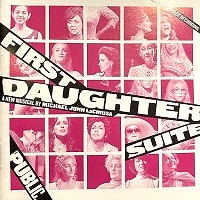
 (4 / 5)
(4 / 5) 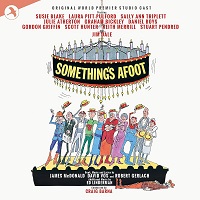
 (1 / 5) Nearly 50 years after the show’s opening and short-lived stint on Broadway in 1976, this long-awaited studio recording captures the highs and lows of Something’s Afoot, a musical modeled to spoof the stories of Sir Arthur Conan Doyle and Agatha Christie, with particular allusion to Christie’s novel And Then There Were None. The characters, all British stereotypes, are knocked off one by one, and the dialogue on the album does an adequate job of conveying the story beats to the listener. Alas, despite a genre ripe for spoofing, as well as the apparent nostalgia some fans feel for this show, the songs are uninteresting for the most part. Both the music and lyrics are strikingly repetitive, and each song overstays its welcome by a verse or two. The capable cast includes several stage veterans of the West End: Sally Ann Triplett, Laura Pitt-Pulford, Jim Dale, and Susie Blake. They all do their best, but are often forced to resort to over-the-top characterizations in order to sell the mediocre material. Blake plays the show’s primary sleuth, and gets the best songs here. While the score is hardly a rediscovered treasure, other highlights include the jaunty “I Owe It All” and the sweet-sounding but dark finale, “A New Day.” On the other hand, the euphemism-filled “Dinghy” falls completely flat. Those who are already fans of the show from its brief runs on Broadway and then in London will enjoy this recording, but it seems unlikely to win over any new listeners. — Forrest Hutchinson
(1 / 5) Nearly 50 years after the show’s opening and short-lived stint on Broadway in 1976, this long-awaited studio recording captures the highs and lows of Something’s Afoot, a musical modeled to spoof the stories of Sir Arthur Conan Doyle and Agatha Christie, with particular allusion to Christie’s novel And Then There Were None. The characters, all British stereotypes, are knocked off one by one, and the dialogue on the album does an adequate job of conveying the story beats to the listener. Alas, despite a genre ripe for spoofing, as well as the apparent nostalgia some fans feel for this show, the songs are uninteresting for the most part. Both the music and lyrics are strikingly repetitive, and each song overstays its welcome by a verse or two. The capable cast includes several stage veterans of the West End: Sally Ann Triplett, Laura Pitt-Pulford, Jim Dale, and Susie Blake. They all do their best, but are often forced to resort to over-the-top characterizations in order to sell the mediocre material. Blake plays the show’s primary sleuth, and gets the best songs here. While the score is hardly a rediscovered treasure, other highlights include the jaunty “I Owe It All” and the sweet-sounding but dark finale, “A New Day.” On the other hand, the euphemism-filled “Dinghy” falls completely flat. Those who are already fans of the show from its brief runs on Broadway and then in London will enjoy this recording, but it seems unlikely to win over any new listeners. — Forrest Hutchinson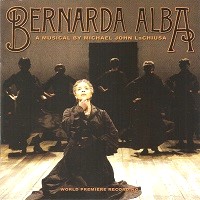 Off-Broadway Cast,
Off-Broadway Cast, 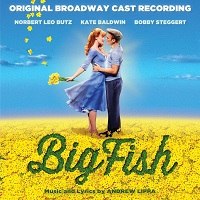
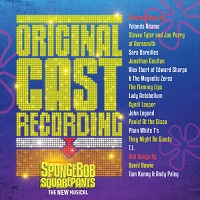
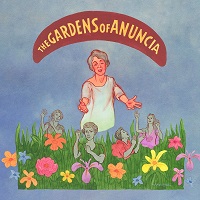
 (4.5 / 5) From the shimmery first notes of The Gardens of Anuncia, listeners will get the feeling they’re entering a magical land. What follows is a gem of a show that tells the story of the upbringing of the great Broadway choreographer Graciela Daniele. (The character here closely based on Daniele is known as Anuncia.) The roles of the three women who raised Daniele, known as “Mami,” “Grandmama,” and “Tia,” are brought to vivid life by Michael John LaChiusa’s extravagant melodies and precise lyrics, and the performers of these roles provide the listener with great gifts: the soaring vocals of Eden Espinosa (Mami), the undeniable charm of Andrea Burns (Tia), and the singular combination of brashness and heart possessed by Mary Testa as Grandmama. (Who else could bring you to the verge of tears with the lyrics “Eat your macaroni!/I don’t want you to be hungry?”) The title role is played dually by Priscilla Lopez, who provides the proper serenity and charm in narrating the show as the older Anuncia, and Kalyn West, who does an admirable job as the innocent, young version of the character, being taught the ways of the world by her three female mentors. The show risks feeling saccharine towards the beginning, as most of the early songs are simply depictions of the happy lives of the four women. But the music is never uninteresting — listeners should not be surprised if they find themselves humming the opening refrain about “Mami, Grandmama, Tia, and me.” The show takes a sharp left turn once Anuncia’s mother is taken as a political prisoner; in “The Vigil,” LaChiusa’s haunting music does justice to the confusion and anxiety every member of the family must have felt during that difficult time. And in “The Story of That Man,” Anuncia stops serving as a secondary character to the women who raised her, coming to the forefront as she shares the traumatic and limited memories she has of her father. Lovely diversions from these more serious moments are provided by two singing deer, both played by Tally Sessions, who appear in the older Anuncia’s garden to impart an important life lesson: “Dance while you can.” Sessions brings a vaudevillian touch to the proceedings, and these numbers brilliantly fit with the rest of the score despite their surface silliness. This show never feels like a vanity project, but Daniele’s ultimate mission in creating it is clear throughout: To give the three strong women who raised her their due. That goal is accomplished with special beauty in the finale, “Never a Goodbye,” in which older Anuncia finally buries the ashes of her aunt. Considering this recording’s many delights, no listener will be sorry that they let LaChiusa and Daniele lead them down this garden path. — Charles Kirsch
(4.5 / 5) From the shimmery first notes of The Gardens of Anuncia, listeners will get the feeling they’re entering a magical land. What follows is a gem of a show that tells the story of the upbringing of the great Broadway choreographer Graciela Daniele. (The character here closely based on Daniele is known as Anuncia.) The roles of the three women who raised Daniele, known as “Mami,” “Grandmama,” and “Tia,” are brought to vivid life by Michael John LaChiusa’s extravagant melodies and precise lyrics, and the performers of these roles provide the listener with great gifts: the soaring vocals of Eden Espinosa (Mami), the undeniable charm of Andrea Burns (Tia), and the singular combination of brashness and heart possessed by Mary Testa as Grandmama. (Who else could bring you to the verge of tears with the lyrics “Eat your macaroni!/I don’t want you to be hungry?”) The title role is played dually by Priscilla Lopez, who provides the proper serenity and charm in narrating the show as the older Anuncia, and Kalyn West, who does an admirable job as the innocent, young version of the character, being taught the ways of the world by her three female mentors. The show risks feeling saccharine towards the beginning, as most of the early songs are simply depictions of the happy lives of the four women. But the music is never uninteresting — listeners should not be surprised if they find themselves humming the opening refrain about “Mami, Grandmama, Tia, and me.” The show takes a sharp left turn once Anuncia’s mother is taken as a political prisoner; in “The Vigil,” LaChiusa’s haunting music does justice to the confusion and anxiety every member of the family must have felt during that difficult time. And in “The Story of That Man,” Anuncia stops serving as a secondary character to the women who raised her, coming to the forefront as she shares the traumatic and limited memories she has of her father. Lovely diversions from these more serious moments are provided by two singing deer, both played by Tally Sessions, who appear in the older Anuncia’s garden to impart an important life lesson: “Dance while you can.” Sessions brings a vaudevillian touch to the proceedings, and these numbers brilliantly fit with the rest of the score despite their surface silliness. This show never feels like a vanity project, but Daniele’s ultimate mission in creating it is clear throughout: To give the three strong women who raised her their due. That goal is accomplished with special beauty in the finale, “Never a Goodbye,” in which older Anuncia finally buries the ashes of her aunt. Considering this recording’s many delights, no listener will be sorry that they let LaChiusa and Daniele lead them down this garden path. — Charles Kirsch